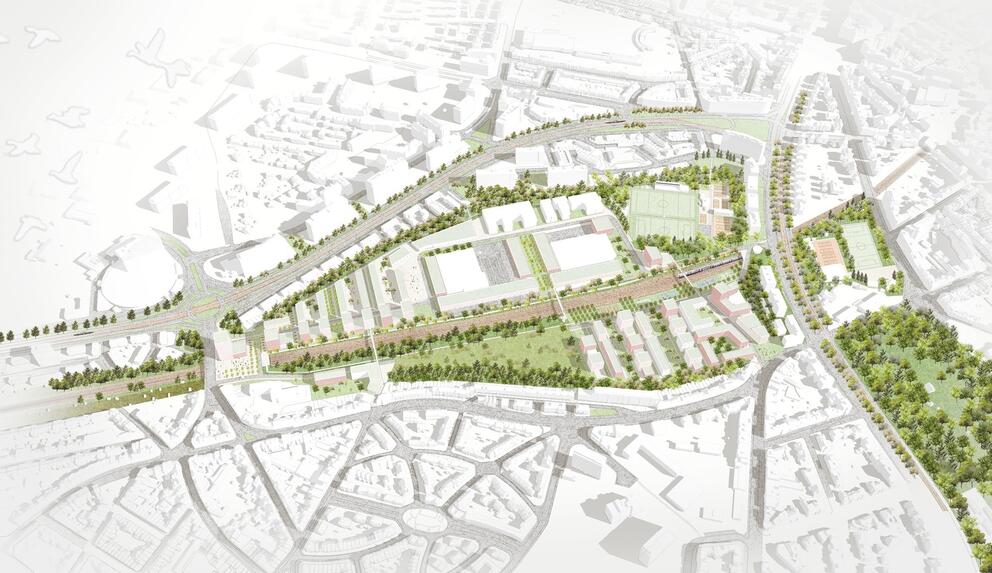Brussels Government approves new version of draft PAD-RPA at first reading
On the initiative of Minister-President Rudi Vervoort, the Government of the Brussels-Capital Region voted in favour of the new version of the draft PAD-RPA (territorial development plan – PAD-RPA) for Josaphat at its first reading on Thursday 1 July. The plan has been modified by and received input from the results of the public consultation, the views of official bodies and reflections and alternative proposals from members of the public. A new public consultation and the simultaneous consultation of the regional bodies, including the Regional Development Commission (CRD-GOC), are planned for September 2021.
It will be recalled that a first version of the draft Josaphat PAD-RPA, which sought to establish the regional urban development vision for this strategic site owned by the SAU, successfully passed through its first reading by the Brussels Government on 23 May 2019. In line with the legal procedure set out by the Brussels Territorial Development Code (CoBAT-BWRO), the draft PAD-RPA and associated environmental impact report (RIE) were the subject of a public consultation from 3 October 2019 to 2 December 2019. At the same time, the municipalities concerned and the regional bodies listed by CoBAT-BWRO were invited by the Government to submit formal opinions. At the end of the process, and under the challenging conditions of the public health crisis, the CRD-GOC finally submitted its opinion on 23 April 2020.
After careful examination of the submitted complaints and opinions, Minister-President Rudi Vervoort quickly indicated that he wished to take into account the legitimate criticisms and fears that had been expressed. At his request, perspective.brussels was therefore given the task in July 2020 of working on a substantial modification of the draft PAD-RPA, focusing particularly on the issues of density, mobility and protection of biodiversity.
The main changes introduced by the draft Josaphat PAD-RPA 2021 are as follows:
- Protection of biodiversity: the open wasteland environment, which is key to the site’s current biodiversity, will be conserved in an area of 1.28 ha through the creation of a new ‘biopark’ exclusively dedicated to biodiversity, to be managed by Brussels Environment. This new public park will be integrated with the existing Wadipark, Spoorpark and embankments (which have been kept in the new version of the plan). The result will be 5.05 ha of uninterrupted parkland;
- Green spaces: landscape quality is a major concern of the Region that influences the structure of the new plan. The figures speak for themselves: green spaces have been significantly expanded, now occupying 40% of the area of the draft PAD-RPA (or nearly 13.5 ha);
- Density: the site’s urban development has been reviewed in light of the increased space reserved for nature: all housing will be located in two inhabited cores in the north and south-west of the site, reducing gross above-ground floor space by 17% at the level of the PAD-RPA, and by as much as 19% for housing. This means dropping plans for nearly 400 homes (a total of 1,200 homes as compared with 1,600 previously). The planned dwellings include 323 social housing units and 215 middle-income dwellings;
- Public facilities: the draft plan introduces a whole new integrated school and sports facility which will be developed by the Municipality of Schaerbeek. This complex will share the sports hall between the primary school and the secondary school, which will be built on the site on either side of the railway, with a connecting public footbridge;
- Mobility: the decrease in density and the reconfiguration of the space around two inhabited cores in the north and south of the site will greatly improve mobility in and around the site. With this amended plan, the Government has thus again underlined its ambition to minimise the impact of cars and private parking on the site, with the objective of gradually achieving a car-free district;
- Environmental impact report: this has been significantly expanded and updated in order to determine with precision the environmental impact of the changes decided on by the Government. In this context, numerous additional analyses have been performed in all environmental categories;
- Competitive dialogue: the Government has reiterated its determination to preserve and continue the competitive dialogue procedure, overseen by the SAU, which is currently underway.
Rudi Vervoort, Minister-President of Brussels: ‘I welcome this important government agreement which, I believe, was awaited by many citizens interested in the future of the Josaphat wasteland site. The teams from perspective.brussels and the consultancy firms (urban planners, architects, engineers, etc.) have worked tirelessly for months in order to present a completely overhauled plan to the Government. I hope that the Government will allow the development of this strategic area to continue unhindered while offering effective responses and solid guarantees in light of the legitimate demands that came out of the public consultation. As we know, this planning process has been the subject of close attention and has provided input for democratic debate, which I welcome. Contrary to what one might read or hear, today's agreement once again demonstrates the value of public consultations. And in an unprecedented step in Brussels, a new public consultation is scheduled for September and will offer the people of Brussels an additional opportunity to express their views on the revised draft PAD.’
‘The aim of the modified plan is to further enhance the sustainable character of the Josaphat site, by taking better account of the various climate-related issues in the context of a development that also meets the need in Brussels for, among other things, affordable housing. The new plan therefore seeks to meet local people’s aspirations more closely,’ emphasises Antoine de Borman, Managing Director of perspective.brussels.
